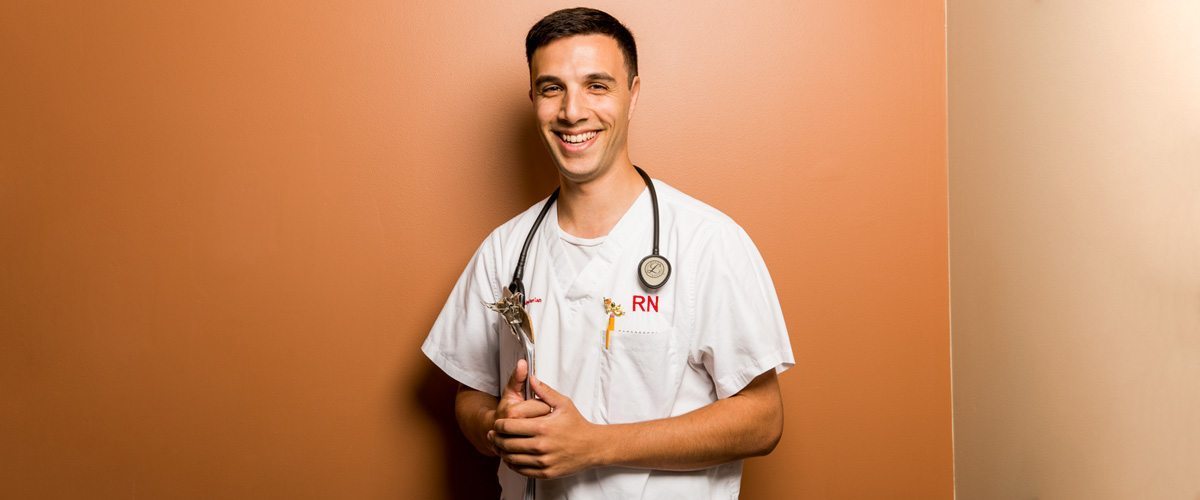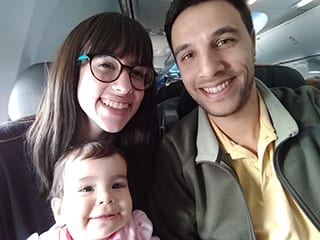After Cancer: A Career in Nursing
Why a college athlete, sidelined by cancer, was inspired to become a nurse.


It felt like a kick in the groin, recalls Natan Santacruz of the pain he felt one morning after an intense run.
He was 23, a college sophomore, and a competitive long-distance runner. He was used to pushing through adversity to achieve his goals, be it trying to break a 6-minute mile in half-marathons or earning a psychology degree at Rutgers University in New Brunswick, New Jersey.
“So I pushed off seeing a doctor and stuck to my routine,” Natan says. “But then it didn’t get better on its own. It got worse.”
In his anatomy class, he self-diagnosed a hernia, chalking it up to his workouts. His doctor in New Jersey disagreed. After an ultrasound, Natan had his results read the same day by a family friend, a radiation oncologist. The friend invited Natan and his mother over for dinner, where he told Natan that he had a 1-inch tumor in his right testicle.
“I was in shock,” Natan says. “I just kept thinking about all the worst possible scenarios.”
The oncologist friend made an appointment for Natan with Dr. James McKiernan, urologist-in-chief at NewYork-Presbyterian/Columbia University Irving Medical Center and chair of the Department of Urology of the Columbia University Vagelos College of Physicians and Surgeons.
“He said he was the best,” Natan says, “and he said we’d be in great hands.”
What came next, after Dr. McKiernan explained testicular cancer to Natan, was another test of the athlete’s mental strength. After his testicle was surgically removed, tests found some vascular invasion, which indicates that the cancer may have spread beyond the testicle. Natan was told he would need a more invasive surgery to find out for sure. In December 2012, Dr. McKiernan and his team made a large incision from Natan’s sternum to his groin, temporarily removed his bowels, then removed all 27 retroperitoneal lymph nodes in a hard-to-reach place behind the organs in the abdomen.
“But the best news I got was the next day when Dr. McKiernan came to see me,” Natan says. “He said they took out 27 lymph nodes and dissected them right there when I was on the table and didn’t find evidence of it spreading.”
In the days after his operation, Natan was fighting pain yet felt “pathetic” as he lay in bed watching TV. When his Foley urinary catheter was due to be removed, Natan recalls feeling exposed and embarrassed, and his anxieties spiked. But when the nurse took it out, “I remember feeling like I was really safe in her hands,” he says. “I was willing to trust, let go of my desire to be in control, and just let her be in control of my care.”
He continues, “I think that’s the most vulnerable I’ve ever felt in my whole life. I think that’s where I really started to notice how wonderful the role of nursing really is because of their patience, sensitivity, and kindness. They were able to make a big difference in my emotional recovery and made me feel a little bit better about myself.”
This wasn’t the first time that Natan experienced great care from nurses.
As a child, he had undergone 10 surgeries by age 10 because he was born with microtia and atresia in his left ear. “I was basically born without an outer or middle ear,” he explains.
Although being in the hospital can be especially scary for children, Natan says he remembers loving it there. “My nurses were amazing. We played video games together and played Nintendo.”
“I wanted to be somebody who could be a rock for patients, hold their hands … to make their experience a little better.”— Natan Santacruz
It was during his time as a young adult patient at NewYork-Presbyterian/Columbia University Irving Medical Center that he had an epiphany – he would become a nurse.
“I wanted to be in a position where patients were in a situation of vulnerability and need, and I could be somebody who could be a rock for them and hold their hands and be a model of calmness and consistency through their struggle to make their experience a little better,” he says.
Switching Gears
It would take months for Natan to recover and return to Rutgers to finish his bachelor’s degree. He also began taking the necessary classes to apply to nursing school. After graduating from Rutgers in May 2015, he enrolled in the accelerated nursing program at New York University, where, as a student, he worked as a nursing companion at NewYork-Presbyterian/Weill Cornell Medical Center.
While assisting nurses, he was able to experience many departments but was most impressed by the hematology and oncology unit on floor 10 South of the Greenberg Pavilion. He was struck by the way nurses interacted with patients and spent time with them.
“I was blown away by the ability of these nurses to connect with their patients,” he says. “I wanted to work on a floor where that was the culture, the expectation.”
When Natan applied for nursing jobs after graduating in January 2017, he emailed the unit’s patient care director, Autumn Ashley, to explain why he wanted to join her team. The email stood out as special, recalls Ashley. Natan got an interview and began his job that May.

Natan and Sara with Maya, who was born in January 2018
In late 2017, he reached his five-year mark when he went back to Dr. McKiernan for his checkup and his tests came back clean, as they had up to that point, meaning he’ll no longer need regular appointments. Meanwhile, Natan, now 30, and his wife, Sara, bought a home in Fair Lawn, New Jersey, and welcomed their first child, Maya, in January 2018.
“Having testicular cancer is associated with infertility, so I thought there was a pretty high risk that I wasn’t going to be able to have kids naturally,” he says. “And then, my wife woke me up and showed me the two lines on the pregnancy strip and we were just really excited. And I couldn’t be happier.”
Because Natan has been on the other side of the chart, so to speak, he has a special perspective on how nurses provide patient care.
“I don’t think people think enough about the emotional and psychological [aspects of] recovery and what role nurses play in just being by the bedside and really just being there during those most vulnerable moments,” he says.
Ashley, the patient care director, is impressed with the way Natan connects with his patients.
“Every patient’s room that I walk into, they rave about the care that Natan is providing,” she says. “He takes time to listen to our patients and learn who they are as a person. He works hard to find out what might be important to them outside of their hospital stay and goes above and beyond to find a unique way to connect. He demonstrates empathy and compassion.”
Sitting and talking with patients on the hematology and oncology unit is the part of his job Natan likes the most. Every day, nurses aim to spend at least five minutes sitting with each patient. And it’s not infrequent that he ends up staying after his shift to spend quality time with a patient, such as when he spent an hour exchanging stories with a great-grandmother who has leukemia or silently held the hand of a father of two young sons who knew he would die soon.
“They’re not just an anonymous patient in an anonymous hospital gown,” Natan says. “They’re a person with a story.”

